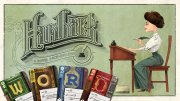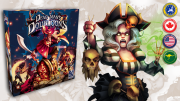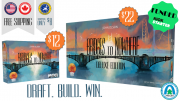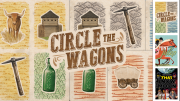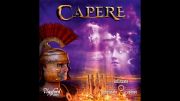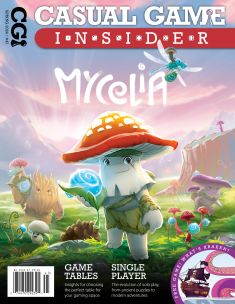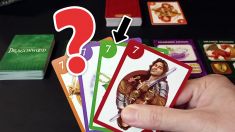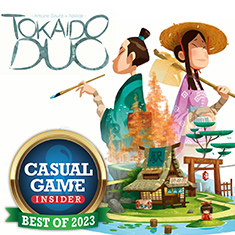Hardback (Tim Fowers) – Players are racing to be the first to score sixty points in this deck-builder-meets-word game. Each player begins with a starting deck of letters. You draw a hand of five cards and on your turn can use these to build a word. For each letter in your word you earn something. Some letters will earn you cents which you can use to buy more and different letters, while some letters earn you points. You can also use money to buy ink tokens. You are allowed to play a letter facedown as a wildcard though you won't get any benefit for the letter you played facedown; still it might help you spell more words. Each letter card also belongs to one of four genres, and some have unique abilities such as taking an ink remover token or doubling another letter. Playing multiple cards of the same genre at one time gives you a better chance of creating combs with your cards' abilities. Ink tokens are used to draw an extra card from your deck, but because you used ink to draw it, you must use it in your word, unless you use ink remover to undo it.
Casual Game Crowdfunding: Books, Plagues, and Pirates

From bestsellers to the black plague, social deduction to card drafting, this month brings an eclectic mix of games to Kickstarter with something for just about everyone.
Infected (Black Forest Studio) – One player is the plague doctor, spreading the Black Death. Players must try to vaccinate other players while trying to figure out who is the doctor. At the start of the game, each player chooses a random set of cards. Each set of cards either belongs to the villagers (though even they do not have all the same distribution of card types) or to the plague doctor. Each round you play a card face down on another player. These cards can either mean that player is safe for this turn, infected, or must roll the dice to see if he becomes infected. If you are infected, you are out of the game unless you have received a vaccination card. Players do not reveal the card that was passed to them but simply look at it and then inform the other players if they are safe or infected. Some infection cards activate immediately, while others can take one or two turns to go into effect, as can some vaccination cards. Villagers win if the plague doctor becomes infected by a dice roll or if his identity is correctly guessed.
Dead Man's Doubloons (Thundergryph Games) – All players simultaneously take their turns on two fronts: their ships battle it out on the oceans, while their captains each explore an island searching for buried treasure. Each player has a hand of action cards from which they choose three, which they reveal one by one at the same time. Action cards include such options as moving your ship, attacking other ships, repairing your ship, boarding an enemy ship in order to steal from another player, or hunting for treasure. There are multiple paths on the island to the treasure, some safer but longer, while others may be more dangerous but quicker if you can survive. If your ship is destroyed, it becomes a ghost ship, until you gather enough doubloons to bring the ship back to life. Once one of the pirate captains has retrieved the treasure from the island, all captains return to their ships, new action cards are unlocked, and players have one final ocean battle. The richest pirate at the game’s end wins.
Bridges to Nowhere (Doomsday Robots) – Each round, six bridge cards are placed face up on the table and players take turns drafting them until all the cards have been selected. There are three types of bridge cards. Each has a pair of symbols and a point value. Another six cards are then placed face up to be drafted next round, but before the next draft you move on to the building phase. Each bridge must begin with a pillar from the pillar deck that each player is given. Bridge cards can only be attached to pillars or other bridge cards that match their type. The point values of each bridge card also determine where you can place cards in each segment. You can also build a second or even a third level to your bridge, if you have enough pillars. At the end of the game, players will score extra points if they have matching symbols next to each other. Players may also choose to discard bridge cards if they do not fit on their bridge, and once you've moved onto the next round of the game, any cards on your bridge cannot be moved.
Petrichor (Mighty Boards) – In this lovely board game, with beautiful, peaceful artwork, you are a cloud, using weather to grow crops. Only the other clouds are trying to beat you to it and grow the crops themselves. With frost you create new clouds, with sun you add water to your clouds, with wind you move clouds around, and with rain you water crops. When harvest time arrives, plants that have grown score points. Players influence when the harvest happens and how often, trying to align it with when they will score the most points.
Circle The Wagons (Button Shy) – In this two-player game, players are using cards to build their own town. The cards are laid out in a wheel shape. On your turn you may choose the next card in line or skip it, but then you must hand any cards you skipped over to your opponent. Each card has four icons on it, and icons can come in various different colors. You lay out the cards, building up your town, until all the cards have been taken from the wheel. You score points for grouping colors together, and various other ways in which you place your icons relative to the position of other icons and colors. The player with the most points wins.
Good Help (Baksha Games) – Each player is a mad scientist trying to build their Frankenstein Monster with the help of their two assistants. Players move their doctor and assistants around the town, working for money, collecting supplies, buying or digging up body parts or attacking another player’s assistant to try and steal the ones they’ve already gathered, and then heading back to their castle to build their monster and wreck the town...or kill the other player's monsters. You can read our review of the game here.
Capere (Paul Ali) – In this abstract strategy game, each player takes control of eight soldiers. A grid board is set in the middle of the table and each player puts their pieces on it. At the start of your turn, you draw a card from the top of the deck. These cards can be movement cards, in which case it must be played immediately, or god cards. If the movement card is for more than one space, you can split it between more than one soldier. God cards give you special abilities. If you draw a god card, you set it aside and use it later, drawing another card until you get a movement card. Players earn points for reaching the opposite side of the board or capturing another player's soldier by surrounding it on four sides.
Disclosure: unless otherwise noted, we have not seen or played any of the above games. Our assessment of each is based on the information given on the crowdfunding project page.






